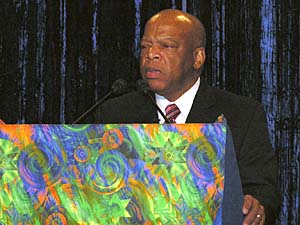|
Audio
Photos
|
Minneapolis, Minn. — Lewis says he considers Martin Luther King Jr. a friend, a prophet and a hero. Lewis met King as a college student in the 1960s, and Lewis became a leader in the civil rights movement.
At age 23, Lewis helped organize the 1963 march on Washington. He helped lead the 1965 march from Selma to Montgomery, and was injured in a confrontation with state troopers.
Lewis told a crowd of about 2,000 people that his admiration for King grew as the two marched together and were jailed together.
"He was a spokesperson not only for blacks, but for all of those who've been left out and left behind," said Lewis. "Martin Luther King Jr. spoke to the hearts and conscience of all of us who believed that nonviolence and love offer a more excellent way, a better way."
Lewis talked about experiencing segregation as a child in rural Alabama. He remembered having to sit in the balcony at the movie theater while white children sat in the main level. It was a time when blacks sat in the back of the bus and at separate lunch counters.
"When I asked my mother, my father, my grandparents, my great-grandparents, 'Why segregation? Why racial discrimination?' And they said, 'That's the way it is. Don't get in the way. Don't get in trouble," Lewis recalled.
Lewis refused to accept segregation. He says he was so inspired by King's vision of equality that he tried to get a library card at the age of 16.
"We were told by the librarian that the library was for whites only, and not for coloreds. But on July 5, 1998, I went back to the public library in the little town of Troy, Alabama for a book signing of my book, 'Walking With The Wind'. And they gave me a library card," Lewis said.
Lewis says that moment shows how far the nation has come in overcoming racial inequality. But while the "colored-only" signs are gone, Lewis says there is more work to be done.
He says voting irregularities in the last two elections show that America can't forget about the fight to achieve voting rights.
"People in the American South died for the right to vote, they died for the right to participate in the democratic process," Lewis said. "And we must encourage all of our young people to become registered and get out and vote like we never voted before."
After his speech, Lewis said the plight of African-Americans in the Gulf Coast after Hurricane Katrina demonstrates that the issues of race and poverty still exist in America.
"I don't know what it's going to take," Lewis said. "I don't know whether we must organize another powerful nonviolent movement, to put people back into the streets by the hundreds and by the thousands to say to America, deal with hunger, deal with poverty, deal with the issue of race."
Many in the crowd were inspired by Lewis' speech. Kenneth Charles, who directs college recruiting for General Mills, says Lewis made the civil rights struggle come alive, particularly for young people who didn't live through it.
"I think part of the challenge, for young people in particular today, is that it seems like it was a different time, a different world and that these things never happened," said Charles. "And to have somebody be able to give the first-person experience and bring it to life, I think was very, very impactful."
Charles says Lewis energized the audience to continue to push for equality. Lewis urged the crowd to help others, letting the spirit of Martin Luther King be their guide.




